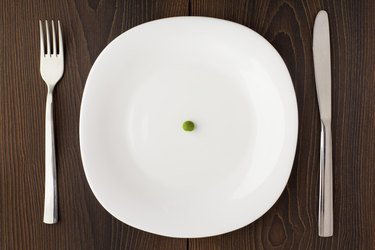
Your body uses the simple sugar glucose as fuel for energy. You obtain glucose from the carbohydrates you eat. If you do not eat regularly, your body does not have access to glucose, and as a result, your blood sugar will lower, a medical condition called hypoglycemia. Severe hypoglycemia can cause dangerous complications, such as seizures, loss of consciousness and death.
Physiology
Video of the Day
When you consume carbohydrates, your body breaks them down into glucose, which enters your bloodstream through your small intestine. The presence of glucose in your bloodstream signals your pancreas to release insulin, which attaches to the glucose and carries it to your cells. Your cells use the glucose they need and then the rest of the glucose is converted to glycogen and stored in your liver.
Video of the Day
When you go for a period of time without eating, your blood sugar lowers and your pancreas releases a hormone called glucagon, which triggers your liver to release glycogen. If you go too long without eating, the glycogen stores in your liver become depleted, leaving you without a source of energy.
Symptoms
Glucose is the preferred source of energy for your brain.To function properly, your brain needs a steady supply of glucose, which is provided only by eating regularly. If you do not eat regularly, your brain becomes starved of glucose and several physical symptoms may develop. Possible symptoms of lowered blood sugar include confusion, double vision, blurred vision, tremor, anxiety, hunger, increased perspiration and heart palpitations.
Treatment
The quickest way to treat low blood sugar is to eat sugary foods. Sugar moves through your digestive system quickly and enters your bloodstream rapidly, causing your blood sugar to rise almost immediately. Hard candy, honey, fruit juice or pure sugar can help correct low blood sugar if caught early enough.
If your symptoms are severe or in the case of loss of consciousness, you may require intravenous administration of glucose or an injection of glucagon directly into the bloodstream.
Prevention
To prevent hypoglycemia caused by not eating, it is important to eat regularly. Eat five to six small meals throughout the day to provide your body with a steady supply of glucose. If you are prone to hypoglycemia, it may be beneficial to keep hard candies with you or keep cans of soda in your car. If you are not able to have a meal, the candy or soda can keep your blood sugar high enough to prevent symptoms until you are able to eat.
Is this an emergency? If you are experiencing serious medical symptoms, please see the National Library of Medicine’s list of signs you need emergency medical attention or call 911.